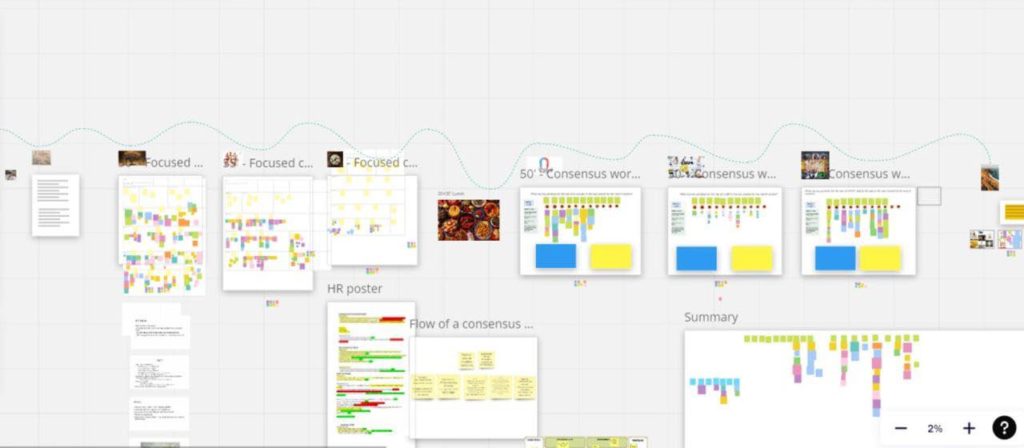By Anastasiya M. (Participant of Group Facilitation Methods Online Course, 2022)
In late summer 2022, ICA:UK received a request from Anastasiya. Anastasiya had been displaced months earlier as a result of the Ukrainian war and was looking for facilitation training to help bring her team together. Thanks to the help of our donors, we were able to offer her a scholarship to attend the course. Anastasiya writes about her experiences of war, group facilitations training and how it helped her team to take time to reflect on their experiences and forge a path forward.
Working for Human Resources in a war-torn country. Working with people suffering from the effects of war. Can you prepare enough? Can training help?
In January 2022, I was working as part of a seven person HR team for an IT company. The team worked in a 400-person office in Kyiv, Ukraine. Just like any other company we were working on planning the year ahead. Yet, in the news we were reading about the possibility of a war. “Should we be preparing for a war?”, one of us said to a silent room. “No, no, it is not possible for a war to start, ” replied others. We raised the question with the local management team, but everybody thought the threat of war was just Russia flexing its muscles or would take the form an information war. However just weeks later, the potential of war had become a real prospect on the horizon for our HQ.

So, we started preparing for the possibility of a war. How do you even start to do that?
Firstly, we developed a few possible scenarios of what could happen to focus our efforts and energy on risk management where it was possible. Secondly, we made people safety and business continuity plans.
We considered an evacuation plan for the Kyiv office, designed a policy for mobilised people and looked for an alternative office in West Ukraine. Then, together with business units in the HQ we made plans for business continuity with involvement of other offices’ capabilities.
We also set up special communication channels in our corporate communication tools and in alternative messenger, conducted information sessions for all workers telling them about possible scenarios, our preparations and possible further actions.
Despite our preparations, we could not believe the war was still a reality, even one day before it began. And then it all happened…I received a call from a friend at 5 am on Feb 24, 2022: “Hello. Where are you? The war has started!”
Sirens started going off. The children and I hid in a bathroom which was in the middle of the house. I had my laptop and continued working. The first week was a nightmare. We lost contact with some of the people who were near Bucha and in Kherson. There was no electricity in those towns and people could not charge their phones. In Kherson it was dangerous; calls could be intercepted. People started to evacuate in masses. The borders closed on day one in the afternoon for men. The “military condition” had been announced by the President of Ukraine and it meant that our men had to defend the country.
All of us in HR did our best to organise evacuation from Kyiv for those willing to evacuate and were looking for housing for people in Western Ukraine and in Poland. We worked with little sleep.
Half a year passed and we continued working. Then we reached a stage where we all as an HR team wanted to stop, breathe, draw conclusions and understand how we wanted to move further.
During these crazy six months, my children and I moved to the UK under the “Homes for Ukraine” scheme. I then decided to apply to the Group Facilitation Methods course run by ICA:UK. Very generously, I was offered a scholarship to participate.
At the ICA:UK Group Facilitation course we learned the Focused Conversation and Consensus workshop Methods for working with groups. And when, as an HR team, we decided to run a workshop for ourselves to draw conclusions of our “wartime HR” experience, I, together with a colleague of mine, designed a workshop using these group facilitation techniques. Here is how we structured the workshop over 1.5 days:
(1) Check-in. We asked people to draw pictures of their source of energy in these difficult times
(2) Focused conversations. Before lunch, we had three structured focused conversations. We had input from HR people from Israel of what they did during the war. So the first Focused Conversation was about Israeli input and what conclusions we can draw from it. The second focused conversation was about feedback about our work that we gathered from Department Managers and Team leads of our organisation. And the third focused conversation was about HR goals we set for ourselves in 2022, which, it emerged, needed to be revised.
In between the sessions, rather than eating lunch separately, we decided to sit together online and eat lunch together. This meant we were able to exchange our different stories.
(3) The afternoon was quite heavy work – we facilitated two consensus workshops to be followed by a third on another day. During these consensus workshops we analysed the roles of (a) recruiter, (b) HR Business Partner and (c) LnD specialist during the war and what our colleagues need from different members of the HR team during this unique and difficult time.
We drew many interesting conclusions, but the key question was – how do we use these conclusions to improve our work? Thus we placed all possible actions and take outs onto a clean board with Impact/Efforts axis and drew a curved line, taking into work actions that would bring the most impact while costing us less effort.
(4) We ended the sessions by asking participants to add pictures in the chat of their “main conclusion”. These 1.5 days involved very intense thinking but were ultimately very rewarding. I am very thankful to ICA:UK for providing me the tools to work with my team and put our thoughts in order. Thank you!
